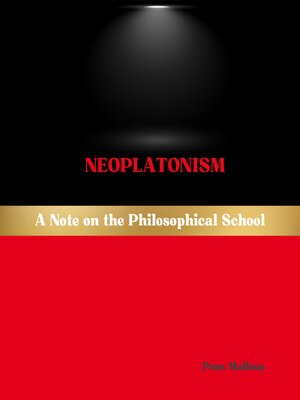Neoplatonism
audiobook (Unabridged) ∣ A Note on the Philosophical School · Western Philosophical Schools
By Pons Malleus

Sign up to save your library
With an OverDrive account, you can save your favorite libraries for at-a-glance information about availability. Find out more about OverDrive accounts.
Find this title in Libby, the library reading app by OverDrive.



Search for a digital library with this title
Title found at these libraries:
| Library Name | Distance |
|---|---|
| Loading... |
This audiobook is narrated by a digital voice.
This audiobook is an invitation to enter the profound and often mystical world of Neoplatonism, a philosophical tradition that flourished in late antiquity and shaped the spiritual and intellectual landscape of the Western world for centuries. Born in the third century CE, Neoplatonism is more than a mere continuation of Plato's philosophy—it is a richly textured system that seeks to articulate the structure of reality, the nature of the soul, and the path to spiritual ascent. It weaves together metaphysics, ethics, cosmology, and mystical theology in a unified vision that sees all existence as an emanation from a singular, ineffable source: the One.
The central figures of Neoplatonism—Plotinus, Porphyry, Iamblichus, Proclus, Damascius, and others—did not see themselves as innovators, but as interpreters and preservers of Plato's genuine intentions. Yet in interpreting Plato, they constructed a systematic worldview that was distinctly their own. Plotinus, the acknowledged founder of the school, described reality as a great chain of being emanating from the One, through Nous (divine intellect) and Soul, down into the material world. This metaphysical cascade was not merely theoretical; for the Neoplatonists, it had deep ethical and spiritual significance. The goal of philosophy was not just understanding, but union—henosis—with the divine source.
Neoplatonism emerged in a time of cultural synthesis, as Hellenistic philosophy interacted with the religious traditions of the Roman Empire, including pagan mystery cults, early Christianity, Gnosticism, and later Islam. As such, it became a bridge between the classical and medieval worlds, influencing Christian theologians like Augustine, Pseudo-Dionysius, and Aquinas, as well as Muslim and Jewish philosophers such as Al-Farabi, Avicenna, and Maimonides.







